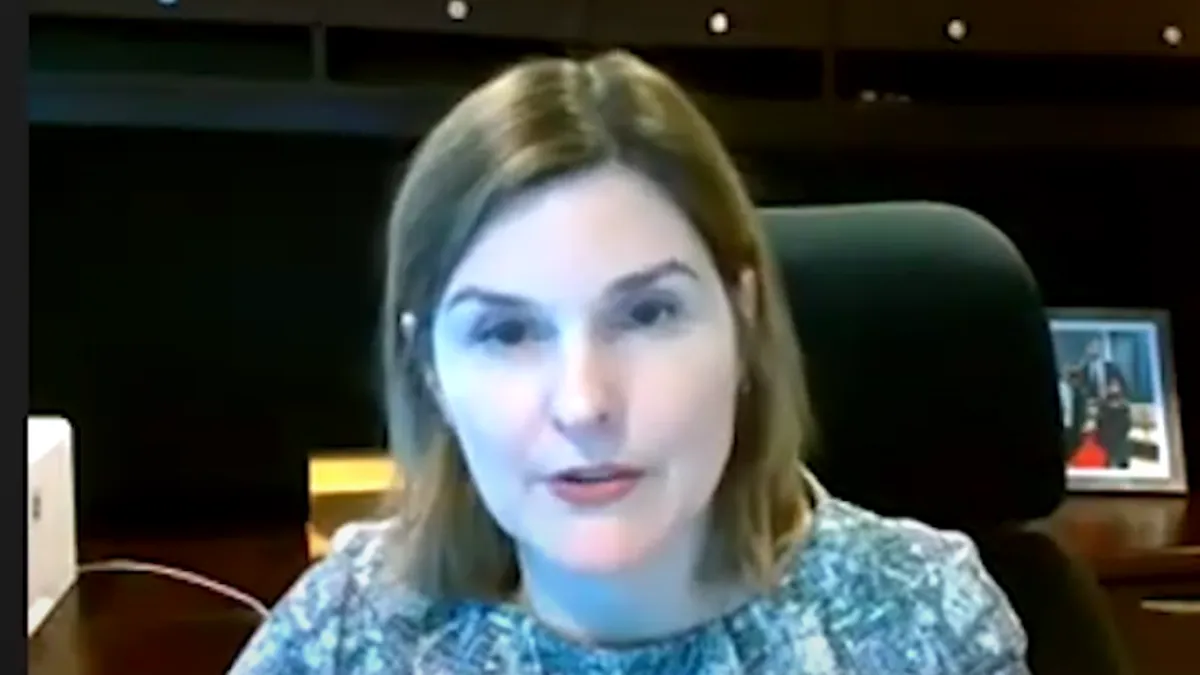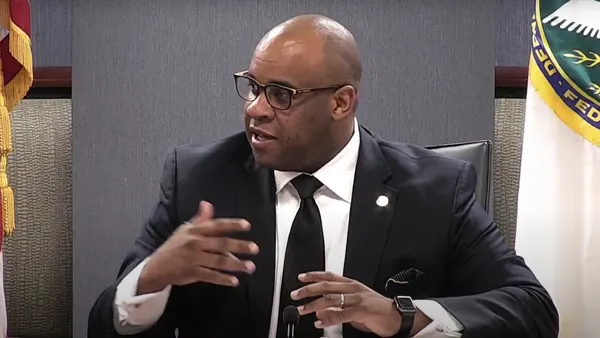Dive Brief:
-
The Federal Energy Regulatory Commission is continuing to bring its rules and regulations in line with the energy transition, with transmission reform a top priority, FERC Commissioner Allison Clements said Tuesday during a webinar hosted by Resources for the Future.
-
FERC's other main priorities are updating the way the agency reviews natural gas pipeline proposals and bolstering the electric grid to withstand the effects of climate change, according to Clements.
-
Clements is also focused on making sure the energy transition affects people fairly. "The decisions we make ... increasingly impact people," Clements said. "When you're making any given decision, in my mind, raising up the issues of equity for people needs to be part of how this agency successfully regulates."
Dive Insight:
FERC is working to update its rules and regulations so they match the country's changing resource mix and meet the challenges of our times, such as climate change, according to Clements.
"We have a transmission grid that was in large part designed, not built but designed, over 100 years ago, but the basics of it haven't changed," Clements said.
Clements expects FERC will issue a proposal in the "coming months" to update its transmission planning, cost allocation and generation interconnection requirements.
"There are lots of energy transition, climate-related, clean energy-related things that filter into the actions the commission takes, but our job is to facilitate low cost, affordable delivery of electricity," Clements said.
"Part of reforming transmission is because we have a set of world class resources in the form of wind and solar that are far from where people live, and if we make smart investments in transmission infrastructure, we can deliver those resources so that the total cost – transmission plus generation – of electricity delivered to customers is lower overall," Clements said. "That's the goal."
FERC has the authority to approve transmission projects in national transmission corridors that are unable to get required state or local permits, but Clements said the agency isn't eager to use that regulatory tool.
"I have said, and I've heard my colleagues say similar things, that that [backstop] authority is not the end all, be all," Clements said. "That's not how we're going to get to ‘yes' on building cost-effective transmission in this once-in-a-generation need to make a significant investment in our electric grid. We get to ‘yes' by working with states toward outcomes that they think make sense and that they buy into as well as all others, including customers."
FERC and the National Association of Regulatory Utility Commissioners are working through a task force to try to reach some consensus around transmission issues, Clements noted. The task force's second meeting is set for Feb. 16.
FERC is responsible for regional transmission planning and states have authority over siting transmission infrastructure, Clements noted. Those two processes should be interconnected, according to Clements.
"We have barriers, but let's at least get these processes talking to each other as much as possible," she said.
Considerations around extreme weather should be built into transmission planning, Clements said, citing the National Oceanic and Atmospheric Administration's estimate that there were 20 weather-related disasters last year that separately caused more than $1 billion in damage.
"These stressors are landing on a grid in transition," Clements said. "It's a constant effort to keep up."
While FERC is an "economic regulator" focused on making sure the rates it approves are "just and reasonable," the agency should also incorporate considerations of equity and environmental justice into its decisions, according to Clements.
"When things get bad, we know that the communities that are bearing the brunt and the worst impacts are those that are already marginalized, whether they be environmental justice communities or otherwise disadvantaged communities," Clements said.
Communities are most directly affected by gas infrastructure FERC approves, but there are also effects from its electricity-related decisions, according to Clements.
"Everything the commission does has some eventual impact on costs, on price, that will eventually show up in customers' utility bills," Clements said. "How do we allow those realities to inform our decisions?"
One avenue is through FERC's new Office of Public Participation, which aims to help more people take part in the agency's decision-making processes, according to Clements.
The office isn't designed to create a "separate world" for members of the public who are concerned about FERC's decisions, according to Clements.
"It is allowing them access to our proceedings and if we have more facts on the record, we will make better decisions … and they'll be more durable," Clements said.















